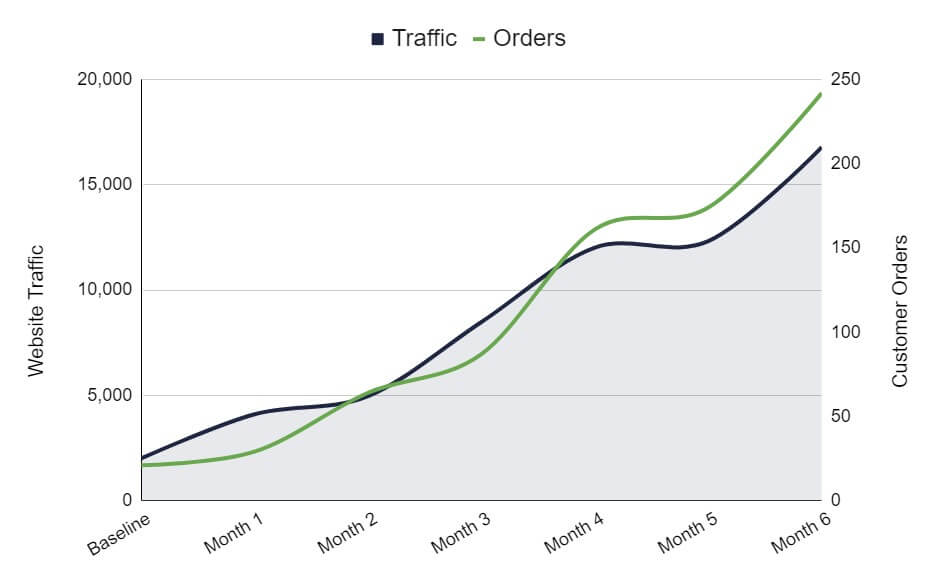
Unlock your e-commerce brand’s full potential in the organic channel.
In today’s competitive digital marketplace, effective SEO is the key to reaching more customers, increasing sales, and building long-term success without relying on paid placements.
E-commerce SEO goes beyond basic optimization, targeting the unique elements of online stores—from faceted navigation to product ratings and category hierarchy.
With the right strategies in place, your store can gain more visibility, improve user experience, and convert casual browsers into loyal customers.
E-commerce sales continue their growth trend to make up over 20% of total retail sales worldwide. That’s a $6.3 trillion dollar market.1
This is trending up from 2023’s massive $5.8 trillion sales volume at 19.4% of the total retail market.2
This significant growth underscores the critical role of e-commerce in today’s economy. As consumers increasingly prefer online shopping for its convenience and variety, businesses must adapt to this digital shift to remain competitive.
Implementing effective SEO strategies is essential for e-commerce platforms to enhance visibility, attract targeted traffic, and convert visitors into loyal customers. By optimizing their online presence, businesses can tap into this expanding market, driving sales and fostering long-term growth.
Strategic Advantages of SEO for E-Comm
Implementing SEO strategies in e-commerce offers benefits that can significantly enhance a business’s online presence and profitability. Improving SEO for an online store, businesses can attract more qualified traffic and improve user engagement.
- Enhanced Product Visibility: Optimizing product pages with relevant keywords and detailed descriptions improves search engine rankings, making products more discoverable to potential customers.
- Increased Organic Traffic: Effective SEO strategies attract targeted visitors actively searching for specific products, leading to higher conversion rates.
- Cost-Effective Marketing: Unlike paid advertising, SEO offers sustainable, long-term results without ongoing expenses, providing a higher return on investment.
- Improved User Experience: SEO practices such as optimizing site speed, mobile responsiveness, and intuitive navigation enhance user satisfaction and engagement.
- Brand Credibility and Trust: High search engine rankings instill trust and credibility, as users often perceive top-ranking sites as more authoritative.
E-Comm SEO Challenges
While e-commerce SEO provides substantial advantages, it also presents specific challenges that businesses must address to achieve optimal results. Understanding these potential drawbacks is essential for developing effective strategies and allocating resources efficiently.
- Intense Competition: The e-commerce sector in many industries is highly competitive, making it challenging to achieve and maintain top search engine positions.
- Technical Complexities: Managing aspects like faceted navigation, duplicate content, and site architecture requires specialized knowledge to avoid SEO pitfalls.
- Consistency is Critical: SEO is a long-term strategy; significant improvements in rankings and traffic may take time to materialize.
- Algorithm Updates: Search engines frequently update their algorithms, necessitating continuous monitoring and adaptation of SEO strategies.
TechAudits can take your E-Commerce store to the next level.
Get started with managed SEO services today.
What makes E-Commerce SEO different from other sectors?
E-commerce SEO differs from other sectors by focusing on product detail and collection page optimization, managing large inventories, and enhancing a more complex user flow experience. Unlike informational sites, e-commerce platforms require unique product descriptions, high-quality images, detailed information, and a smooth user experience.
The dynamic nature of product listings demands continuous SEO efforts to maintain search visibility. Complex site structures necessitate careful attention to architecture and internal linking for improved crawlability and navigation.
Incorporating customer reviews, ratings, and rich snippets is crucial, as these elements influence purchasing decisions and search rankings. These factors highlight the specialized approach required for effective e-commerce SEO strategies.
In e-commerce, each product detail page (PDP) must have a unique page optimized with detailed descriptions, clear images, and relevant keywords to attract potential buyers and enhance visibility on search engines.
Effective product page optimization can increase rankings and drive traffic, but it requires precision:
- Keyword Integration: Incorporate keywords naturally in product titles, descriptions, and meta tags without sacrificing readability or user experience.
- Unique Descriptions: Avoid duplicate content by crafting unique product descriptions that highlight benefits and features in a compelling way.
- High-Quality Images: Use optimized images that showcase the product well, supporting both SEO and user engagement.
- Buyer Value Proposition: To truly drive conversions, highlight the value and unique advantages of the product over alternative options.
Additionally, there are product landing pages (PLP) to optimize that house a collection of products within an attribute, category, or other grouping. These pages act as critical hubs for your product content, aiding in user navigation and link equity flow.
Managing Large Inventories
Many e-commerce sites handle extensive catalogs that require organized categories, filters, and navigation for both SEO and user experience. Structuring these inventories is vital:
- Internal Linking: Implement a strategic internal linking structure to help search engines understand relationships between products and categories.
- Category Pages: Optimize category and subcategory pages for specific keywords to improve visibility.
- Faceted Navigation: Use faceted product attribute filters like size, color, and price carefully to avoid duplicate content or URL variations that could harm SEO.
Frequent updates to product availability, pricing, and new releases make e-commerce SEO challenging, requiring continuous updates to maintain visibility.
- Structured Data Markup: Use structured data (schema) for real-time updates on prices and availability in search results, enhancing click-through rates.
- Price Changes and Seasonal Updates: Update prices and product availability promptly, ensuring accurate information for both users and search engines.
- Temporary and Seasonal Products: Manage out-of-stock or seasonal items to avoid creating broken links or losing valuable SEO value.
Reviews, ratings, and customer testimonials provide fresh, relevant content that can positively influence search engine rankings and build trust. Key benefits of user-generated content include:
- Keyword Variations: Reviews often include additional keywords, increasing page relevance for long-tail searches.
- Enhanced Credibility: Positive reviews improve buyer confidence and can help drive conversions. This trust building and user engagement can bolster your site’s E-E-A-T signals as well.
- Fresh Content: Regular user reviews and ratings create fresh content that is valuable for SEO.
Conversion rate optimization focuses on turning visitors into paying customers, crucial in e-commerce SEO. CRO tactics for e-commerce include:
- Trust Signals: Include security badges, return policies, and customer testimonials to increase buyer confidence and improve conversion rates.
- Streamlined Checkout Process: Reduce steps and add options like guest checkout to prevent cart abandonment.
- Personalized Recommendations: Use data-driven product recommendations to increase sales and engagement.
Technical SEO is especially vital in e-commerce due to complex site structures and potential issues with indexing and crawlability.
- Structured Data & Schema Markup: Add structured data for products, reviews, and availability, helping products stand out in search results with rich snippets.
- Site Speed: E-commerce sites with many products and images must optimize load times to reduce bounce rates and improve user experience.
- Mobile Optimization: With many consumers shopping on mobile devices, ensure mobile responsiveness and usability.
in monthly revenue
in website traffic
See how TechAudits helped a contacts lens brand scale revenue from $17K to $568K ARR (annual run rate)
This brand started as a smaller family-run business, built on WordPress. We were able significantly scale their business and organic performance, while maintaining the comfortable and familiar WordPress CMS platform.





